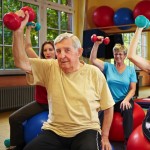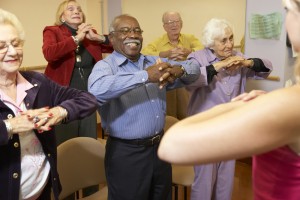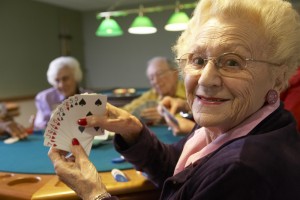
Depression is a common problem in older adults with some data suggesting significant symptoms are present in over 40% of nursing home residents (Teresi, 2001). Clearly physical exercise has a number of benefits particularly with regards to cardiovascular health.
Some of you may remember the Mental Elf blog back in September 2012 with positive results from a systematic review looking specifically at exercise for depression in older people.
Given the medical comorbidities in this population and risks associated with polypharmacy, looking at effectiveness of non-pharmalogical interventions is important.
The Lancet have recently published the OPERA (Older People’s Exercise intervention in Residential and nursing Accommodation) study. This cluster randomised controlled trial led by a team at Warwick University, compared symptoms of depression (baseline and 12 month follow up) in an intervention group of care homes receiving a structured moderate intensity activity programme with a control group.
Methods

People in the intervention group participated in twice weekly group exercise sessions led by a physiotherapist
180 care homes in the Coventry and Warwick region and in North East London were approached to take part in the study. A total of 73 homes with between 16 and 70 beds were included. All participants were over the age of 65 and permanent residents. Inappropriate residents were excluded (acute or terminal illness, recent bereavement, communication problems).
- Homes were randomised to intervention or control groups.
- Intervention homes had depression awareness training, a twice weekly 45 minute group exercise session led by a Physiotherapist (for up to 12 months, no minimum duration) and general advice on being more physically active (whole home component). Control homes just had the depression awareness training.
The primary outcome measured was Geriatric Depression Scale-15 (GDS-15) score. This was assessed at baseline and 12 months following randomisation for all participants (overall cohort). The team decided on differences in GDS of 1.2 points to be clinically important.
Patients who were depressed at baseline (depressed cohort), also had the GDS-15 repeated at 6 months post randomisation. A cross-sectional analysis was also carried out (prevalence of depression amongst all participants resident in a study home at 12 months).
Secondary comparisons included MMSE, quality of life (EQ-5D), and fear of falling.
Results

The exercise treatment in this study did not reduce depression in the care home residents
The bottom line from the study was:
We identified no statistically significant, or clinically important, between-group differences in the GDS-15 score.
- In the overall cohort, the control group was actually found to be slightly less depressed – “The adjusted mean difference in GDS scores between the two groups at 12 months was 0·13 points (95% CI –0·33 to 0·60, p=0·5758)”
- In the depressed cohort, both the intervention and control group had a drop of around 1 point in their GDS-15 scores – “the adjusted mean difference was 0·22 (95% CI –0·52 to 0·95, p=0·5662)”
- 43% of the intervention group (n=288) and 49% of the control group (n=307) were depressed at 12 months – odds ratio 0.76 (95% CI 0·53 to 1·09, p=0·1304)
- No difference was found between the intervention and control groups in the secondary outcomes
Conclusions
The authors concluded:
We identified no evidence that our intervention had a positive effect on any of our carefully selected primary or secondary outcomes. This evidence does not support the use of this type of intervention to reduce the burden of depressive symptoms in residents of care homes, and alternative strategies for this common and important problem are needed.

So this particular exercise programme doesn’t seem to help with depression, but other activities are no doubt on the cards
This is a well designed study with a good number of participants and I think it is useful in that it shows that the particular package studied was not effective in this population. The value of a non-pharmacological intervention which improves depressive symptoms in this group is undeniable and I believe the area warrants further study.
The interventions looked at in the systematic review mentioned earlier (Teresi, 2001), were exercise between 3 and 5 times a week and it may be that the frequency of group sessions was not high enough to have an effect, however such a high intensity programme may not be so attractive to elderly care home residents.
Links
Underwood M. et al Exercise for depression in elderly residents of care homes: a cluster-randomised controlled trial. Lancet. 2013 May 1. pii: S0140-6736(13)60649-2. doi: 10.1016/S0140-6736(13)60649-2. [Lancet abstract] [Full PDF monograph from HTA website]
Teresi J, Abrams R, Holmes D, Ramirez M, Eimicke J. Prevalence of depression and depression recognition in nursing homes. Soc Psychiatry Psychiatr Epidemiol. 2001 December; 36(12): 613–620 [PubMed abstract]


Moderate intensity exercise programmes do not improve depressive symptoms in elderly care home residents: resu… http://t.co/8SVHVEnEda
Rupert Thurston blogs about the results of the OPERA trial in @TheLancet http://t.co/0q4Z4inLkR #exercise #depression
Read our blog on the OPERA (Older People’s Exercise intervention in Residential & nursing Accommodation) RCT http://t.co/0q4Z4inLkR
RT @Mental_Elf: OPERA (Older People’s Exercise intervention in Residential & nursing Accommodation) RCT http://t.co/qKr6dYaa8U
The OPERA RCT finds that moderate intensity #exercise is disappointing at treating #depression in later life http://t.co/0q4Z4inLkR
Why did @TheLancet OPERA RCT find that physiotherapist-led group exercise didn’t help much for depression? http://t.co/0q4Z4inLkR
The current panacea, exercise, fails to help depression in elderly http://t.co/QxZ4pfmwNg (drugs don’t work either)
Don’t miss: moderate intensity exercise programmes don’t improve depressive symptoms in care home residents http://t.co/0q4Z4inLkR
@Mental_Elf Publicising this could be problematic: older people could be discouraged from exercise when it has substantial physical benefit.
SBS – Moderate intensity exercise programmes do not improve depressive symptoms in elderly http://t.co/5BidcXyA7r via @sharethis
As a group fitness professional I question this “well-designed” study. By whose measure is this well-designed? The only reason the study came to this conclusion was because the physical movement was poorly designed and poorly led. You probably only consulted a personal trainer. This is so ridiculous. I teach instructors how to teach low intensity classes and that’s how I train. And it elevates my mental state every time (by releasing that good feeling hormone) as I am prone to depression.